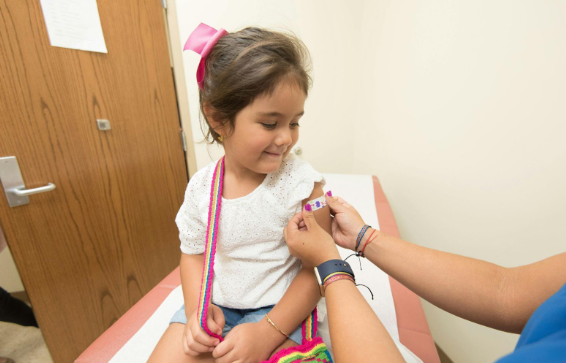Back-to-School Health Checklist: Vaccinations, Physicals, and Preventive Care
Back-to-School Health Checklist: Vaccinations, Physicals, and Preventive Care

As the summer winds down and students prepare to return to school, parents shift their focus from vacations and camps to backpacks, books, and school supplies. But amid the excitement of a new academic year, it's crucial not to overlook one of the most important back-to-school essentials: your child’s health.
Ensuring your child is physically and mentally prepared to return to school is vital for their academic success and overall well-being. From vaccinations and annual physicals to screenings and preventive care, a comprehensive health checklist helps set the foundation for a healthy, productive school year.
The Importance of Back-to-School Health Preparation
Children spend a significant amount of time in close quarters at school, making them more susceptible to communicable illnesses. Proper health maintenance doesn’t just protect your child—it helps keep classmates, teachers, and entire school communities safer. Moreover, early identification of health concerns—whether physical, developmental, or emotional—can lead to better outcomes and support in the classroom.
Required and Recommended Vaccinations
Ensuring your child is up to date on required and recommended vaccinations is one of the most important steps in preparing for a healthy school year. Vaccines help protect against serious, preventable diseases and are often mandated by schools to maintain a safe environment for all students.
Why Vaccinations Matter
The American Academy of Pediatrics recommends completing your child's health history form before your annual wellness exam. Vaccines protect children from serious diseases and play a crucial role in community immunity. As children return to in-person learning, it's essential to ensure their immunizations are up to date. Schools often require proof of certain vaccinations for enrollment, so reviewing and updating records before the school year starts can prevent unnecessary delays.
Core Vaccines by Age
Each state has specific vaccine requirements for school-aged children, but some of the most commonly required or recommended vaccines include:
- DTaP (Diphtheria, Tetanus, Pertussis): Usually required before kindergarten entry.
- MMR (Measles, Mumps, Rubella): Typically required for kindergarten and middle school.
- Polio (IPV): Administered in a series and required for school entry.
- Hepatitis B: Required in most school districts.
- Varicella (Chickenpox): Often required unless the child has had the illness.
- Tdap (Tetanus, Diphtheria, Pertussis Booster): Often required before entering middle school.
- HPV (Human Papillomavirus): Recommended for preteens to prevent future cancers.
- Meningococcal: Recommended and often required for high school or college entry.
Checking and Updating Immunization Records
Parents should contact their child’s pediatrician to review their immunization history. A nurse or healthcare provider can assess whether any catch-up vaccines are needed, especially if there were delays due to the COVID-19 pandemic.
The Annual Physical: More Than a Routine Check
An annual physical exam offers a holistic view of your child’s health and development, far beyond just meeting school requirements. It provides an opportunity to identify any emerging concerns, track growth milestones, and foster a trusting relationship between your child and their healthcare provider.
Comprehensive Health Evaluation
An annual physical is more than a box to check—it’s a critical opportunity to evaluate a child’s growth, development, and overall health. Pediatricians monitor height, weight, BMI, vision, hearing, and blood pressure while also assessing developmental milestones, behavioral health, and social factors that may affect school performance.
Sports Physicals vs. General Physicals
Many middle and high schools require students participating in athletics to undergo a sports physical. While similar to a general physical, a sports physical places extra emphasis on musculoskeletal health, endurance, and cardiovascular fitness. Combining both physicals during one appointment can be an efficient way to meet school and sports requirements.
Chronic Condition Management
For children with asthma, diabetes, ADHD, or other chronic conditions, the annual physical is also a time to update treatment plans, renew prescriptions, and ensure school staff have the proper instructions and medications in case of emergencies.
Preventive Screenings: Catching Issues Early
Preventive screenings are essential for detecting health issues that might otherwise go unnoticed, especially in growing children. Early identification of vision, hearing, or developmental challenges can significantly improve a child’s ability to learn, socialize, and thrive in the school environment.
Vision and Hearing Screenings
Children may not always recognize or verbalize problems with their vision or hearing, which can significantly impact learning.
Routine screenings can catch:
- Myopia (nearsightedness)
- Amblyopia (lazy eye)
- Color blindness
- Hearing loss from infections or fluid buildup
Early detection enables timely interventions, such as prescription glasses, hearing aids, or referrals to specialists.
Mental and Emotional Health Check-ins
Increased awareness around mental health has led many pediatricians to incorporate age-appropriate mental health screenings into routine visits. Anxiety, depression, stress, and bullying can all influence a student’s ability to thrive in school. Open conversations between healthcare providers, parents, and children can reduce stigma and lead to appropriate support or referrals.
Nutrition and Lifestyle Habits
A well-balanced diet and healthy daily habits play a vital role in your child’s physical and mental performance at school. Establishing routines around nutritious meals, physical activity, sleep, and screen time helps support concentration, energy levels, and emotional well-being throughout the school year.
Building Healthy Eating Routines
With school lunches, early mornings, and busy evenings, maintaining proper nutrition can be a challenge. Pediatricians can offer guidance on:
- Packing nutritious lunches and snacks
- Encouraging water over sugary drinks
- Establishing regular meal times
Healthy nutrition fuels brain function, supports immune health, and promotes emotional balance.
Encouraging Physical Activity
While many schools offer physical education, it’s important to supplement this with physical activity at home. Encouraging after-school sports, outdoor play, and limiting screen time are vital to a child’s physical and emotional well-being.
Sleep Hygiene and Screen Time Management
Sleep plays a critical role in a child’s ability to succeed academically and maintain emotional balance. It affects concentration, memory retention, mood regulation, and even the body’s immune function. For school-aged children, adequate rest is not a luxury—it’s a necessity. Preschoolers typically need between 10 to 13 hours of sleep each night, while children aged 6 to 12 should aim for 9 to 12 hours.
Teenagers, who often experience a natural shift in their sleep-wake cycles, still require about 8 to 10 hours of quality rest to function at their best. As the school year approaches, establishing a consistent bedtime routine can help recalibrate internal clocks and make the early morning wake-ups less of a struggle. This transition not only supports better academic performance but also fosters a more positive attitude toward learning and daily responsibilities.
Preparing for Emergencies and Allergies
At the start of each school year, parents should update all medical forms and ensure emergency contact information is accurate. The school nurse should have current details on any medical conditions, medications, and treatment plans, especially for chronic issues like asthma, diabetes, or seizures. Up-to-date action plans help staff respond quickly in an emergency.
If your child has allergies, make sure the school has any necessary emergency medications, such as EpiPens or inhalers, along with clear instructions. Confirm that staff are trained to respond appropriately. For over-the-counter medications like pain relievers or antihistamines, check the school’s policy and provide required permissions or forms.
Partnering with Your Pediatrician
Bring questions to your child’s doctor about developmental concerns, learning challenges, or behavioral issues. Pediatricians can offer valuable insights, refer to specialists, and help guide educational accommodations if needed (e.g., 504 Plans or IEPs).
Back-to-school visits are a springboard for lifelong health habits. Children and teens are more likely to embrace healthy lifestyles when they understand the “why” behind good choices. Use this time to educate and empower them to take ownership of their wellness.
As you check off your back-to-school health list, our experts at
Bayou Bend Health System help you with comprehensive pediatric care. From vaccinations and physicals to screenings and chronic condition management, our experienced team is here to support your child’s health every step of the way.
Schedule your appointment today and give them a confident, healthy start to the school year.



